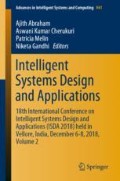Abstract
Cartesian Genetic Programming (CGP) is a type of Genetic Programming, which uses a sequence of integers to represent an executable graph structure. The most common way of optimizing the CGP is to use a simple evolutionary strategy with mutations, which randomly changes the integer values of integer sequence. We propose an alternative genotype-phenotype mapping procedure for CGP allowing usage of real-valued numbers in genotype. Novel representation allows continuous transition between various functions and inputs of each given node (hence the name, Continuous CGP), which means, that the optimization of CGP individual is transformed from combinatorial optimization problem to continuous optimization problem. This allows leveraging various metaheuristic optimization algorithms. In this paper, we present results obtained by Particle Swarm Optimization algorithm, showing that continuous representation is able to outperform classic CGP in some benchmarks and provides competitive results with one of the best performing symbolic regression systems in literature.
Access this chapter
Tax calculation will be finalised at checkout
Purchases are for personal use only
References
Al-Sahaf, H., Zhang, M., Al-Sahaf, A., Johnston, M.: Keypoints detection and feature extraction: a dynamic genetic programming approach for evolving rotation-invariant texture image descriptors. IEEE Trans. Evol. Comput. 21(6), 825–844 (2017)
Al-Sahaf, H., Zhang, M., Johnston, M.: Binary image classification: a genetic programming approach to the problem of limited training instances. Evol. Comput. 24(1), 143–182 (2016)
Biscani, F., Izzo, D.: esa/pagmo2: pagmo 2.9, August 2018. https://doi.org/10.5281/zenodo.1406840
Castejón, F., Carmona, E.J.: Automatic design of analog electronic circuits using grammatical evolution. Appl. Soft Comput. 62, 1003–1018 (2018)
Clegg, J.: Combining cartesian genetic programming with an estimation of distribution algorithm. In: Proceedings of the 10th Annual Conference on Genetic and Evolutionary Computation, GECCO 2008, pp. 1333–1334. ACM, New York (2008). https://doi.org/10.1145/1389095.1389350
Clegg, J., Walker, J.A., Miller, J.F.: A new crossover technique for cartesian genetic programming. In: Proceedings of the 9th Annual Conference on Genetic and Evolutionary Computation, GECCO 2007, pp. 1580–1587. ACM, New York (2007). https://doi.org/10.1145/1276958.1277276
Goldman, B.W., Punch, W.F.: Analysis of cartesian genetic programming’s evolutionary mechanisms. IEEE Trans. Evol. Comput. 19(3), 359–373 (2015). https://doi.org/10.1109/TEVC.2014.2324539
Holland, J.H.: Adaptation in Natural and Artificial Systems: An Introductory Analysis with Applications to Biology, Control, and Artificial Intelligence. MIT press, Cambridge (1992)
Kalkreuth, R., Rudolph, G., Krone, J.: Improving convergence in cartesian genetic programming using adaptive crossover, mutation and selection. In: 2015 IEEE Symposium Series on Computational Intelligence, pp. 1415–1422, December 2015. https://doi.org/10.1109/SSCI.2015.201
Kalkreuth, R., Rudolph, G., Droschinsky, A.: A new subgraph crossover for cartesian genetic programming. In: McDermott, J., Castelli, M., Sekanina, L., Haasdijk, E., García-Sánchez, P. (eds.) Genetic Programming, pp. 294–310. Springer International Publishing, Cham (2017)
Kaufmann, P., Platzner, M.: Advanced techniques for the creation and propagation of modules in cartesian genetic programming. In: Proceedings of the 10th Annual Conference on Genetic and Evolutionary Computation, GECCO 2008, pp. 1219–1226. ACM, New York (2008). https://doi.org/10.1145/1389095.1389334
Kennedy, J.: Particle Swarm Optimization, pp. 760–766. Springer, Boston (2010). https://doi.org/10.1007/978-0-387-30164-8_630
Khan, M.M., Ahmad, A.M., Khan, G.M., Miller, J.F.: Fast learning neural networks using cartesian genetic programming. Neurocomputing 121, 274–289 (2013)
Koza, J.R.: Genetic programming as a means for programming computers by natural selection. Stat. Comput. 4(2), 87–112 (1994)
Lensen, A., Xue, B., Zhang, M.: GPGC: genetic programming for automatic clustering using a flexible non-hyper-spherical graph-based approach. In: Proceedings of the Genetic and Evolutionary Computation Conference, pp. 449–456. ACM (2017)
Meier, A., Gonter, M., Kruse, R.: Accelerating convergence in cartesian genetic programming by using a new genetic operator. In: Proceedings of the 15th Annual Conference on Genetic and Evolutionary Computation, GECCO 2013, pp. 981–988. ACM, New York (2013). https://doi.org/10.1145/2463372.2463481
Miller, J.F., Thomson, P., Fogarty, T.: Designing electronic circuits using evolutionary algorithms. arithmetic circuits: a case study (1997)
Miller, J.F.: An empirical study of the efficiency of learning boolean functions using a cartesian genetic programming approach. In: Proceedings of the 1st Annual Conference on Genetic and Evolutionary Computation - Volume 2, GECCO 1999, pp. 1135–1142. Morgan Kaufmann Publishers Inc., San Francisco (1999)
Miller, J.F., Thomson, P.: Cartesian genetic programming. In: Poli, R., Banzhaf, W., Langdon, W.B., Miller, J., Nordin, P., Fogarty, T.C. (eds.) Genetic Programming, pp. 121–132. Springer, Heidelberg (2000)
Oesch, C.: P-tree programming. In: 2017 IEEE Symposium Series on Computational Intelligence (SSCI), pp. 1–7, November 2017. https://doi.org/10.1109/SSCI.2017.8280849
Papa, J.P., Rosa, G.H., Papa, L.P.: A binary-constrained geometric semantic genetic programming for feature selection purposes. Pattern Recognit. Lett. 100, 59–66 (2017)
Poli, R., McPhee, N.F.: Covariant parsimony pressure in genetic programming. Technical report, Citeseer (2008)
Uy, N.Q., Hoai, N.X., O’Neill, M., McKay, R.I., Galván-López, E.: Semantically-based crossover in genetic programming: application to real-valued symbolic regression. Genet. Program. Evolvable Mach. 12(2), 91–119 (2011). https://doi.org/10.1007/s10710-010-9121-2
Voss, M.S.: Social programming using functional swarm optimization. In: Proceedings of the 2003 IEEE Swarm Intelligence Symposium, SIS 2003 (Cat. No.03EX706), pp. 103–109, April 2003. https://doi.org/10.1109/SIS.2003.1202254
Walker, J.A., Miller, J.F., Cavill, R.: A multi-chromosome approach to standard and embedded cartesian genetic programming. In: Proceedings of the 8th Annual Conference on Genetic and Evolutionary Computation, GECCO 2006, pp. 903–910. ACM, New York (2006). https://doi.org/10.1145/1143997.1144153
White, D.R., McDermott, J., Castelli, M., Manzoni, L., Goldman, B.W., Kronberger, G., Jaśkowski, W., O’Reilly, U.M., Luke, S.: Better GP benchmarks: community survey results and proposals. Genet. Program. Evolvable Mach. 14(1), 3–29 (2013). https://doi.org/10.1007/s10710-012-9177-2
Acknowledgment
This work was partially supported by the Slovak Research and Development Agency under the contract APVV-16-0213 and by the Operational Programme Research & Innovation, funded by the ERDF, project No. ITMS 26240120039.
Author information
Authors and Affiliations
Corresponding author
Editor information
Editors and Affiliations
Rights and permissions
Copyright information
© 2020 Springer Nature Switzerland AG
About this paper
Cite this paper
Loebl, J., Rozinajová, V. (2020). Continuous Cartesian Genetic Programming with Particle Swarm Optimization. In: Abraham, A., Cherukuri, A., Melin, P., Gandhi, N. (eds) Intelligent Systems Design and Applications. ISDA 2018 2018. Advances in Intelligent Systems and Computing, vol 941. Springer, Cham. https://doi.org/10.1007/978-3-030-16660-1_96
Download citation
DOI: https://doi.org/10.1007/978-3-030-16660-1_96
Published:
Publisher Name: Springer, Cham
Print ISBN: 978-3-030-16659-5
Online ISBN: 978-3-030-16660-1
eBook Packages: Intelligent Technologies and RoboticsIntelligent Technologies and Robotics (R0)

